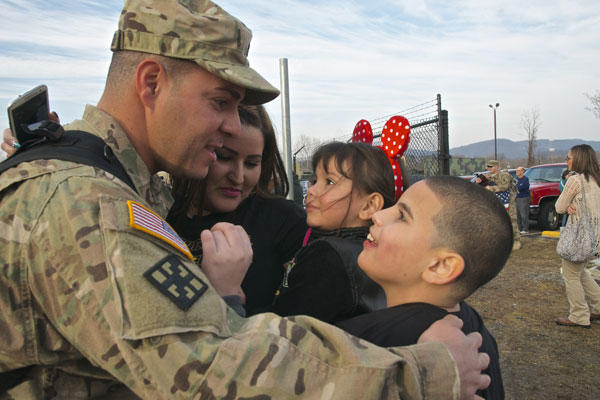Communication is essential to any healthy relationship, especially between parents and children. The way you and your spouse interact with members of the family can have a lasting impact on your child's development.
As a military family, you deal with unique communication issues. It can be hard to know what to do when your spouse is frequently deployed and how to smoothly transition him or her back into the family. It is equally difficult to talk about the physical and emotional effects that war can have on your spouse and, in turn, the whole family.
Deployments, frequent moves and high-stress jobs can all affect the way in which you communicate with your children. There are steps you can take to have more positive and productive interactions with your family, no matter what obstacles may arise.
Below are five tips aimed to help you and your spouse keep open and positive dialogue with your children during tough situations.
1. Recognize different communication styles within your family and learn how these styles impact your relationship.
Good communication requires self-awareness and an increased understanding of your current situation and who you are talking to. It is helpful to recognize whether you interact in a passive, neutral or aggressive fashion, particularly during stressful situations.
If you tend to shut down during arguments or use the silent treatment, you will have to take extra measures to ensure you keep open and positive communication with your children during conflict. Reversely, if you find yourself yelling when you are angry, which can be frightening to children, you may want to learn calming techniques to try during heated situations.
It is equally important to pay attention to how your child handles conflict and stress. A child who screams or storms away during stressful situations requires different communication than those who are more immediately agreeable. Communication with children at any age requires patience, a willingness to listen to differing opinions and compromise.
2. Practice Active Listening.
One of the best ways to learn how your child is growing is to talk with them. Simple conversations such as asking about your child's day will help open the lines of communication. Recognize and respect when children don't want to talk but be available when they're ready.
It's important to give your child undivided attention and appropriate responses when they are talking. Busy families need creative solutions. Try using dinnertime to talk as a family without distractions. This may require everyone to turn off their cell phones for the whole meal!
When spouses are deployed, it is extra important to talk to them about any changes, milestones or growth happening with your children. Keeping your spouse in the loop regularly will ease the transition once they return. If schedules permit, try to set up regular Skype dates where your child can spend one-on-one time talking to the deployed parent.
If your spouse has recently returned from deployment, encourage additional one-on-one opportunities -- like a trip to your child's favorite place -- where the deployed parent can learn directly about what has happened while they were away.
3. Be honest.
Difficult conversations arise for all parents. Growing up is challenging and it is up to the parents to create a safe environment for children to talk about thoughts, actions and feelings.
You and your spouse should decide in advance what topics you are comfortable discussing. Encourage your child to ask difficult questions and show respect by doing your best to answer honestly.
Military families have their own set of topics than can be challenging to discuss. Curious children may want to know what happened while a parent was away. You may hear questions that you don't want to answer.
Talk to your spouse before deployment about how much you're prepared to share, and discuss ways you can answer questions without being too graphic. Be honest with your children if it's something you don't want to talk about.
4. Remember to take care of your own physical and mental wellness.
If you're stressed or anxious, those feelings can be conveyed through your interactions. Adjusting to new situations can be difficult and stress can build up. Don't underestimate the importance of maintaining a physical routine, enjoying a hobby, relaxing or making time for friends. If you're unhappy or overwhelmed, it is extremely difficult to think about anything else.
The way you handle difficult transitions and situations can be adopted by your child. Handling stress is a critical aspect of healthy interactions.
Many communities offer a wide array of activities that can help you and your family maintain healthy habits. Consider taking up a hobby or activity together -- sports such as tennis or bowling can offer a welcome structure to busy lives and encourage positive ways to handle stress for all members of the family.
5. Remind your child how much you love them.
Life is busy and we sometimes forget to remind those around us how much they mean to us. While these feelings are often strong after major events, like when a spouse returns from deployment, don't forget to remind your children just how much you love them as often as possible.
Even if they are at the age where affection is embarrassing, no one ever looked back and said they heard "I love you" too often.
Want to learn more? Visit VeteranParenting.org for more tips on how to develop strategies to strengthen your family.
-- Dr. Peter Shore is a clinical psychologist and developer of Parenting for Service Members and Veterans.
Keep Up with the Ins and Outs of Military Life
For the latest military news and tips on military family benefits and more, subscribe to Military.com and have the information you need delivered directly to your inbox.





















